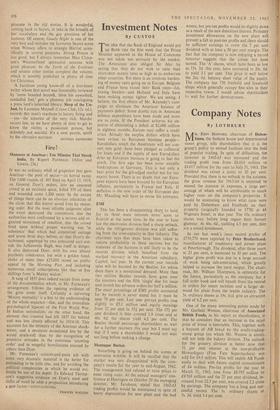Fire !
IT was no ordinary whiff of grapeshot that gave Amritsar—the pool of nectar—its horrid name. The 1,600 rounds of .303 fired on April 13, 1919, on General Dyer's orders, into an unarmed crowd in an enclosed space, killed 379 of them and wounded some 1,200 more. In the nature of things there can be no absolute refutation of the claim that this horror saved lives by restor- ing order. But the most reliable judgment after the event destroyed the contentions that the authorities were confronted by a serious and or- ganised movement of rebellion, that the crowd fired upon without proper warning was 'in substance' that which had committed outrage and arson three days before, or that Dyer's de- tachment, supported by two armoured cars out- side the Jallianwala Bagh, was itself in danger. It also destroyed Dyer, with his own almost psychotic connivance, but with a golden hand- shake of more than £25,000 raised on public appeal by the Morning Post, and including numerous small subscriptions like that of five shillings from 'a Mutiny widow.'
A tang of 1857 does indeed escape from some of the documentation which, in Mr. Furneaux's arrangement, follows the opening evidence of the grim event itself. Certainly a surviving 'Mutiny mentality' is a key to the understanding
of the whole sequence—that, and the immediate psychological legacies of the First World War. In Indian nationalism, on the other hand, the element that counted had left 1857 far behind and was less closely affected by 1914-18. This accounts for the intensity of the Amritsar shock- waves, and a revulsion occasioned less by the actual death-roll than by the recognition of primitive attitudes in the notorious 'crawling order' and in vengeful humiliations exacted by others than Dyer.
Mr. Furneaux's scissors-and-paste job with
some very dramatic material is the better for pretending to be little else, and for avoiding the political complexities in which he would evi- dently be out of his depth. To Edward Thomp- son's suggestive evidence on Dyer's state and shifts of mind he adds a proposition introducing a new factor—arteriosclerosis,
FRANCIS WATSON


































 Previous page
Previous page